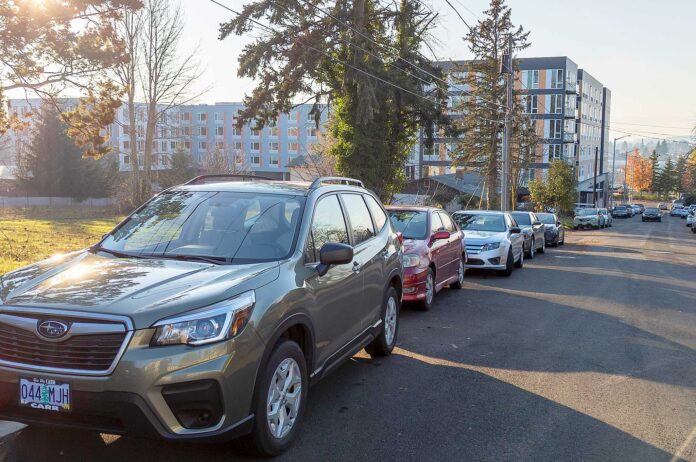
Area developers remain free to include off-street parking in new project designs but are no longer required to do so in Tigard.
During a Dec. 13 meeting, City Council voted unanimously to eliminate minimum parking requirements from the city development codes.
The move brings city codes into compliance with a state climate mandate that additionally requires cities to add electric vehicle charging stations and upgrade alternative transportation infrastructure.
Under previous code, developers were required to provide a minimum number of off-street spaces determined by project use.
The change aligns with Tigard’s vision of promoting public transportation, Community Development Senior Planner Schuyler Warren told the Council.
Warren presented three possible paths forward, recommending adoption of the first and simplest plan to end minimum parking requirements entirely. Two other options would have removed the requirements for large parts of the city and for specific types of building.
The change “increases sustainability and lowers the impact of development and thus climate impacts,” he said.
He pointed to successes in the burgeoning Tigard Triangle as an example of the possible positive impacts, noting designs in that area continue to include parking even without a mandate.
“Land is used more efficiently and less developments are over-parked,” he said. “We’ve seen the development potential of the Triangle unlocked with commercial and housing units proceeding rapidly.”
The state’s failure to include provisions for accessibility parking spaces has raised questions about the future availability of ADA-compliant parking.
“This is a known issue at the state level and the situation is not isolated to Tigard’s code amendments,” Warren said, adding that the state is examining it and he expects a resolution to come quickly.
Accessible parking will be a non-issue in most cases because including even a single space will trigger ADA compliance, but the state is still grappling with a fix for the rare instance that no off-street parking exists.
“Until this ADA issue gets resolved we need to do a really good job of letting our disabled community members know where they can park (when there are events) because that’s an issue for them to the point of them wondering if they should come,” Councilor Elizabeth Newton said.
Newton shared that her brother-in-law, who drives a hand-controlled van equipped with a wheel-chair ramp for getting in and out, has extremely limited parking downtown.
“When he comes to downtown Tigard to go to events the only place he can park is at Symposium,” she said.
Though she supports the change, she questions its current failure to address accessibility.
Some of Tigard’s neighbors are less ready to make the change.
Tualatin and Sherwood are among 12 cities and one county, Marion, that are suing the state to stop or slow the implementation of the mandate, arguing that it’s not feasible for them to meet the quick deadlines for implementation.
The state Land Conservation and Development Commission adopted the rules last July after two years of planning triggered by Gov. Kate Brown’s 2020 executive order requiring state agencies to make policy changes that reduce carbon emissions and climate pollution.
The joint lawsuit, filed in November, asks the court to delay implementation until a judicial review has concluded.





















